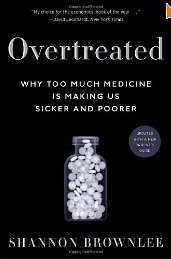February 19th, 2011 by KevinMD in Health Policy, Research
No Comments »

The recurring narrative among health reformers is that hospitals that provide more care raise health costs, but don’t necessarily improve quality. This has lead to a backlash against so-called “aggressive” hospitals and doctors, with upcoming financial penalties to match. But the situation, as always, appears to be more nuanced than that.
In her column in the New York Times, Dr. Pauline Chen looks at one subset of patients who actually may benefit from aggressive care: Those who suffer surgical complications. The study,
found no difference in the rate of complications for aggressive and nonaggressive hospitals. But when they looked at all the patients who had complications and examined their outcomes, the researchers found that regardless of the urgency of their operations, those patients who were cared for at more aggressive hospitals were significantly more likely to survive their complications than those who had their operations at less aggressive hospitals.
In addition, the investigators found that characteristics associated with intensity of care treated surgical complications better:
… a hospital’s failure or success in treating surgical complications correlated consistently with factors that also characterized intensity of care — general expenditures, intensive care unit use and the total days of hospitalization — they found that benefits of this more aggressive care extended well beyond the time of the operation.
I constantly remind readers of this blog that more medicine isn’t necessarily better. The counter-intuitive findings from the Dartmouth Atlas study have been instructive in convincing patients that they are, in many cases, overtreated. Read more »
*This blog post was originally published at KevinMD.com*
February 18th, 2011 by Michael Kirsch, M.D. in Book Reviews, Opinion
No Comments »

 My daughter, Elana, home from college on winter break, offered me a book to peruse from one of her classes. She correctly suspected that her father, the MD Whistleblower, would enjoy reading a book authored by a whistleblower pro.
My daughter, Elana, home from college on winter break, offered me a book to peruse from one of her classes. She correctly suspected that her father, the MD Whistleblower, would enjoy reading a book authored by a whistleblower pro.
The book, “Overtreated: Why Too Much Medicine Is Making Us Sicker and Poorer” by Shannon Brownlee should be required reading for first year medical students, who have not yet acquired views and habits that promulgate excessive medical care and treatment. For those of us already in practice, this book should be a required element of board recertification.
Brownlee understands the medical system well and describes a culture of excess, conflicts of interests, absence of universal quality control mechanisms and fractured and disorganized care with no one in charge of a particular patient. She presents some chilling anecdotes of medical tragedies that have occurred at our most prestigious medical institutions. And she introduces us to reform leaders who understand the system’s inherent deficiencies and their proposals to remedy them.
Brownlee states that explanations for waste in the healthcare system include:
- Cost of a gargantuan bureaucracy
- Medical malpractice fear and defensive medicine
- Incentives for patients with medical insurance to overutilize care
- Rising medical costs
The most important cause, she argues, is unnecessary medical care, which costs the nations hundreds of billions of dollars and exposes patients to the risk of harm from medical complications. She writes, “If overtreatment were a disease, there would be a patient advocacy group out there raising money for a cure.” Read more »
*This blog post was originally published at MD Whistleblower*













